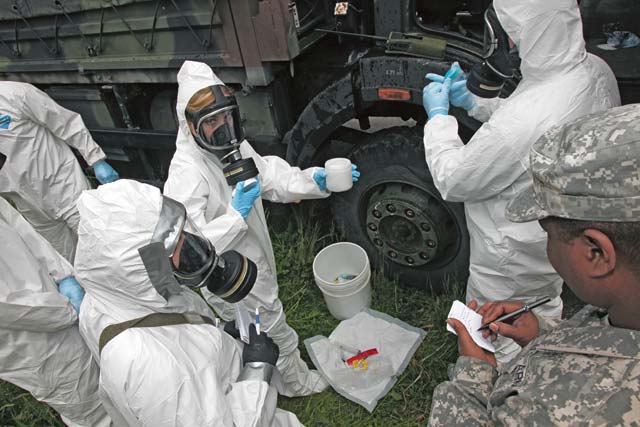
PRISTINA, Kosovo — Soldiers from the 773rd Civil Support Team, 7th Civil Support Command, and one Iowa National Guard Soldier trained 20 members of the Kosovo Security Force’s fledgling HAZMAT unit on incident response procedures and HAZMAT equipment May 12 to 21 during a Defense Threat Reduction Agency-led exercise.
Kosovo declared itself an independent country on Feb. 17, 2008, nine years after the 1999 NATO-led bombing campaign that defeated Serbian troops who used force against ethnic Albanians.
“We were giving them basic HAZMAT training,” said Sgt. Tameeka Dubose, survey team member, 773rd CST, 7th CSC. “We’re really here to assist them in finding their gaps in what they can do better and increase their knowledge of CBRN.”
As of February, more than 100 countries from the United Nations have recognized Kosovo’s sovereignty.
“I was being trained on HAZMAT identification, which helps us analyze and test the samples,” said Pvt. Adelina Demaku, medic, HAZMAT Company, Civil Protection Regiment, Kosovo Security Forces. “I was a paramedic, and it was the first time I got to use the identifier. I used to be in search and rescue unit, and now I understand much more than before. The practice is very important for us. It was valuable for us, and it will help us in the future.”
The NATO-trained Kosovo Security Force was declared fully operational by NATO in July 2013.
“We were trained to be more precise. We were trained on protecting our equipment and the use of different types of equipment and the HAZMAT identifier equipment. We previously had experience on the MultiRAE identifier,” said Cpl. Mete Lajci, a decontamination team member, 1st Platoon, 1st Squadron, CPR, KSF.
The KSF’s current missions are civil protection and to assist Kosovo government authorities in response to a natural disaster or an emergency incident.
The final day of training had the KSF HAZMAT members deal with a simulated scenario of a suspected chemical contamination from a truck accident and spill.
“Today was a culminating practical exercise that tested all of the training we taught them,” Dubose said. “We’re using the training to actually evaluate how much they remember from the equipment we taught them on and applying that and showing us how they would execute a response to a CBRN type incident.
“They showed us that they did learn a lot from us with basic use of equipment and some of the application of the CBRN information we gave them,” Dubose continued. “Seeing them respond to a simulated CBRN incident allowed us to visually gauge where they stand, when it comes to basic CBRN or HAZMAT concerns.”
According to the students during the last response scenario, the KSF HAZMAT Company did some things well and will work to improve in other areas.
“I believe that the whole intervention today went quite well,” Lajci said. “The members who were on my team were busy. I had one person to take photos, one to draw the map and one for communications. Of course it wasn’t all perfect, but I was pleasantly surprised how well we did. The more opportunities we have to train, the more we’re able to progress. We have gained substantial information from the U.S. Soldiers.”
The nearly two weeks of training concluded with a graduation ceremony May 21, attended by several Kosovo and U.S. military dignitaries and the U.S. deputy chief of mission for the U.S. Embassy in Kosovo, who gave remarks during the event.
“The training was very good,” said Cpl. Besnik Lokaj, lab technician, laboratory team, HAZMAT Co., CPR, KSF. “It enabled us to bring together the experiences from the U.S. and Kosovo.”
After the closing ceremony ended, KSF HAZMAT members proudly held their certificates, and their emotions were quite visible as they exchanged handshakes and hugs with their U.S. trainers, posed for cell phone pictures and said their goodbyes.
“I hope they will hold many more trainings like this in the future,” Demaku said. “I just want to thank them for the training and for teaching us.”







